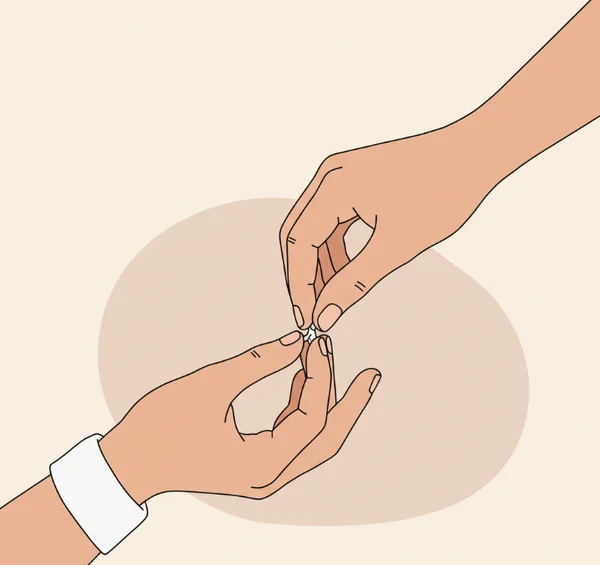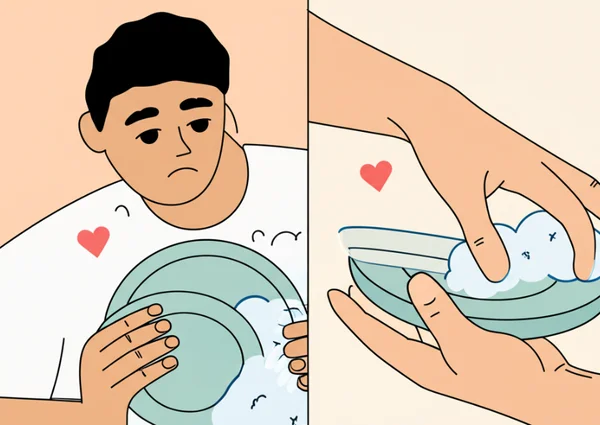Die Sprache der Diensterweisung: Mehr als nur Hausarbeit
May 17, 2025 | By Hannah Carter
Für manche Menschen wird Liebe nicht am besten durch große Bekundungen oder teure Geschenke ausgedrückt, sondern durch greifbare Handlungen. Wenn "Taten sagen mehr als Worte" bei Ihnen oder Ihrem Partner tief Resonanz findet, dann spielt die Sprache der Diensterweisung wahrscheinlich eine bedeutende Rolle in Ihrer Beziehung. Aber was genau sind Diensterweisungen, und wie unterscheiden sie sich von alltäglichen Verpflichtungen? Dieser Leitfaden befasst sich mit der wahren Bedeutung des Zeigens von Liebe durch Handlungen und bietet praktische Ideen für Diensterweisungen, die weit über bloße Hausarbeit hinausgehen. Sind Sie neugierig, ob dies Ihre primäre Art ist, sich geliebt zu fühlen? Sie können Ihr Liebesprofil auf unserer Website erkunden.
Was definiert die "Sprache der Diensterweisung"?
Die "Sprache der Diensterweisung" dreht sich darum, freiwillig Dinge für eine andere Person zu tun, von denen Sie wissen, dass sie diese zu schätzen wissen. Was bedeutet die Sprache der Diensterweisung in Liebesbeziehungen? Es geht darum, Fürsorge, Unterstützung und Zuneigung auszudrücken, indem man ihre Lasten erleichtert, bei Verantwortlichkeiten hilft oder ihr Leben durch Ihre Handlungen einfach ein wenig einfacher macht.

Das Kernprinzip: Lasten bereitwillig erleichtern
Im Kern geht es bei dieser Sprache um das selbstlose Geben Ihrer Zeit und Energie. Die Betonung liegt auf dem freiwilligen Übernehmen von Aufgaben oder Verantwortlichkeiten zum Wohle Ihres Partners, um ihm zu zeigen, dass Sie sein Wohlbefinden schätzen und ihn unterstützen möchten. Dies ist ein Schlüsselaspekt der Partnerschaftlichen Unterstützung.
Über Hilfsbereitschaft hinaus: Es geht um den Ausdruck von Fürsorge
Während Hilfsbereitschaft ein Bestandteil ist, ist eine Diensterweisung von der Absicht der Liebe geprägt. Es geht nicht nur darum, eine Aufgabe zu erledigen; es geht um die zugrundeliegende Botschaft: "Ich kümmere mich genug um dich, um das für dich zu tun." Diese Liebesbekundung ist von größter Bedeutung.
Wie sie sich von anderen Liebessprachen unterscheidet
Im Gegensatz zu Worten der Bestärkung, die auf verbale Anerkennung angewiesen sind, oder dem Empfangen von Geschenken, bei denen es um materielle Präsente geht, geht es bei Diensterweisungen um den Liebesausdruck durch Handeln. Es ist ein praktischer, praxisorientierter Ansatz, um Zuneigung zu zeigen, der bei denen tief Resonanz findet, die Unterstützung und Hilfe schätzen.
Der entscheidende Unterschied: Aufmerksame Handlungen vs. Routinemäßige Verpflichtungen
Ein häufiger Punkt der Verwirrung ist die Unterscheidung zwischen echten Diensterweisungen und routinemäßigen Aufgaben oder Verpflichtungen. Wie unterscheidet man Diensterweisungen von Hausarbeit?

Der Geist des Gebens: Die Absicht zählt am meisten
Der entscheidende Faktor ist die Absicht hinter der Handlung. Den Abwasch zu machen, weil es "Ihre Reihe" ist, ist eine Verpflichtung. Ihn zu machen, weil Sie wissen, dass Ihr Partner einen schweren Tag hatte und Sie seine Last erleichtern möchten, ist eine Diensterweisung. Die Motivation zu dienen ist entscheidend.
Bedürfnisse antizipieren vs. auf Anfragen reagieren
Während das Reagieren auf eine Bitte um Hilfe eine Diensterweisung sein kann, hat das proaktive Erkennen eines Bedürfnisses und dessen Behandlung, ohne gefragt zu werden, oft noch mehr Gewicht. Dies zeigt Aufmerksamkeit und ein tiefes Verständnis für Bedürfnisse.
Erkennen, wann eine "Hausarbeit" zu einem Liebesbeweis wird
Selbst eine alltägliche Aufgabe kann sich in eine kraftvolle Diensterweisung verwandeln, wenn sie mit einer liebevollen Einstellung ausgeführt wird, speziell um Ihrem Partner eine Freude zu machen oder ihn zu unterstützen. Es geht um das "Warum" hinter dem "Was", das Alltägliche Aufgaben in Fürsorgeausdrücke verwandelt. Wenn Sie sich nicht sicher sind, wie Ihr Partner diese Handlungen wahrnimmt, kann unser Liebessprachentest Einblicke bieten.
Warum "Dinge tun" für manche Menschen Bände spricht
Für Personen, deren primäre Liebessprache die Diensterweisung ist, kann greifbare Hilfe liebevoller wirken als jeder andere Ausdruck. Warum bevorzugen manche Menschen Diensterweisungen?
Das Gefühl, unterstützt und umsorgt zu werden
Handlungen, die Stress reduzieren oder das Leben erleichtern, schaffen ein starkes Gefühl, unterstützt und geschätzt zu werden. Es vermittelt, dass ihr Partner ein wahrer Teamkollege ist, der bereit ist, die Lasten des Lebens zu teilen. Dies fördert die emotionale Verbindung.
Greifbare Liebes- und Bindungsbekundungen
Für manche können Worte leer wirken, ohne entsprechende Taten. Diensterweisungen liefern konkrete, sichtbare Beweise für Liebe und Engagement. Es ist ein praktischer Ausdruck von Zuneigung, den sie sehen und fühlen können.
Wie Handlungen bei ihnen Worte oder Geschenke überwiegen können
Während sie ein Kompliment oder ein Geschenk zu schätzen wissen, kann die Handlung, dass jemand ihnen nachdenklich eine Aufgabe abnimmt, ihren "Liebestank" viel effektiver füllen. Das liegt daran, dass ihre primäre Methode, sich geliebt zu fühlen, durch hilfreiche Taten besteht.
Kreative und praktische Ideen für Diensterweisungen, die Ihr Partner lieben wird
Suchen Sie nach konkreten Ideen für Diensterweisungen? Hier sind einige, um Sie zu inspirieren, von kleinen täglichen Gesten bis hin zu größeren Anstrengungen. Denken Sie daran, sie auf die spezifischen Bedürfnisse und Vorlieben Ihres Partners abzustimmen.

Alltägliche Lasten erleichtern
- Eine lästige Aufgabe übernehmen.
- Ihren Kaffee oder ihr Frühstück am Morgen zubereiten.
- Ihr Mittagessen für die Arbeit packen.
- Besorgungen machen, für die sie keine Zeit hatten.
- Den Wocheneinkauf erledigen oder die Mahlzeiten planen. Diese hilfreichen Gesten können einen großen Unterschied machen.
Aufmerksame Überraschungen
- Ihr Lieblingsgericht nach einem langen Tag zubereiten.
- Ihr Auto unerwartet waschen.
- Ein entspannendes Bad für sie vorbereiten.
- Sich um die Bedürfnisse eines Haustieres kümmern, ohne gefragt zu werden.
- Einen gemeinsamen Raum aufräumen, von dem Sie wissen, dass sie es schätzen, wenn er sauber ist. Überraschende Freundlichkeiten werden oft gut aufgenommen.
Da sein in Zeiten der Not
- Hilfe und Unterstützung anbieten, wenn sie krank oder gestresst sind.
- Sich um Kinder oder Hausaufgaben kümmern, wenn sie überfordert sind.
- Sie zu Terminen fahren.
- Ein offenes Ohr sein und dann gegebenenfalls praktische Hilfe anbieten. Dies zeigt Unterstützung in schwierigen Zeiten.
Ihre Ziele und Hobbys unterstützen
- Ihnen bei einem persönlichen Projekt oder Hobby helfen.
- Einen speziellen Raum für ihre Interessen schaffen.
- Zusätzliche Verantwortung übernehmen, damit sie ein Ziel verfolgen können.
- Etwas für sie recherchieren, das mit ihrer Leidenschaft zu tun hat. Dies demonstriert Partnerschaftliche Unterstützung.
Kleine Gesten, die einen großen Unterschied machen
- Ihr Auto an einem kalten Tag vorwärmen.
- Ihnen ein Glas Wasser bringen, ohne dass sie darum bitten.
- Dafür sorgen, dass ihr Lieblingssnack vorrätig ist.
- Den Müll oder das Recycling entsorgen, bevor er überläuft.
- Ihr Handy aufladen, wenn Sie bemerken, dass der Akku schwach ist. Diese kleinen, aufmerksamen Gesten summieren sich.
Wie man Diensterweisungen anbietet, ohne Groll zu empfinden
Das ständige Ausführen von Diensterweisungen kann manchmal zu Burnout oder Groll führen, wenn es nicht richtig angegangen wird. Wie kann ich Diensterweisungen anbieten, ohne Groll zu empfinden?

Ihre eigenen Motivationen verstehen
Stellen Sie sicher, dass Sie Dienstleistungen aus echter Liebe und dem Wunsch nach Unterstützung anbieten, nicht aus Pflichtgefühl, Schuld oder Erwartung einer bestimmten Gegenleistung. Selbstloser Dienst ist der Schlüssel.
Die Bedeutung von Kommunikation und Grenzen
Sprechen Sie mit Ihrem Partner darüber, was Sie bereit und in der Lage sind zu tun. Es ist in Ordnung, Grenzen zu haben. Gesunde Beziehungen beinhalten Geben und Nehmen, keine einseitige Knechtschaft. Dies ist Teil der gesunden Beziehungsdynamik.
Freude am Geben finden
Wenn Ihre Diensterweisungen mit den tatsächlichen Bedürfnissen Ihres Partners übereinstimmen und geschätzt werden, kann es große Freude am Geben geben. Konzentrieren Sie sich auf die positiven Auswirkungen Ihrer Handlungen. Zu verstehen, ob dies auch eine Ihrer Arten ist, Liebe auszudrücken, kann durch [das Online-Liebessprachen-Quiz] (https://lovelanguagetest.net/) erforscht werden.
Wenn die Liebessprache Ihres Partners die Diensterweisung ist
Wenn die primäre Liebessprache Ihres Partners die Diensterweisung ist, ist es wichtig zu wissen, wie man sie effektiv "spricht". Wie zeigt man Liebe durch Diensterweisungen?

Ihre Wertschätzung für praktische Unterstützung erkennen
Verstehen Sie, dass für sie Ihre Bereitschaft, bei Aufgaben zu helfen, ihre Bedürfnisse zu antizipieren und ihre Lasten zu erleichtern, ein tiefgreifender Ausdruck von Liebe ist. Praktische Liebe ist das, was sie schätzen.
Wie Sie Ihre Handlungen wirklich zum Klingen bringen
Achten Sie auf die Dinge, die ihr Leben wirklich einfacher oder weniger stressig machen. Fragen Sie sie, was am hilfreichsten wäre. Passen Sie Ihre Dienstleistungen an ihre spezifischen Vorlieben an. Personalisierter Service ist wichtig.
Die Falle der "Verpflichtung" vermeiden
Führen Sie Diensterweisungen mit einem fröhlichen und willigen Geist aus. Wenn sich Handlungen so anfühlen, als würden sie widerwillig oder aus bloßer Verpflichtung getan, werden sie wahrscheinlich nicht als Liebesbekundungen empfunden.
Nehmen Sie noch heute Diensterweisungen an!
Die Sprache der Diensterweisung ist eine kraftvolle, greifbare Möglichkeit, Liebe, Fürsorge und Engagement zu demonstrieren. Es geht um mehr als nur Hausarbeit; es geht darum, Liebe durch Handlungen zu zeigen, die nachdenklich, absichtlich und darauf ausgerichtet sind, Ihren Partner wirklich zu unterstützen. Indem Sie die Nuancen verstehen und diese Ideen für Diensterweisungen in Ihre Beziehung integrieren, können Sie eine stärkere, tiefer verbundene Bindung aufbauen.
Denken Sie daran, dass wahrer Dienst vom Herzen kommt. Wenn Sie neugierig sind, wie Diensterweisungen mit Ihren anderen Liebessprachen interagieren oder wenn Sie das vollständige Profil Ihres Partners besser verstehen möchten, kann es unglaublich hilfreich sein, weiter zu forschen. Erfahren Sie mehr über die 5 Liebessprachen hier.
Welche Diensterweisungen bedeuten Ihnen am meisten oder welche machen Ihnen Freude, für andere zu tun? Teilen Sie Ihre Erfahrungen in den Kommentaren unten!
Ihre häufigsten Fragen beantwortet
Hier sind einige häufig gestellte Fragen zur Sprache der Diensterweisung:
Müssen Diensterweisungen große Gesten sein?
Nein, überhaupt nicht. Während große Gesten geschätzt werden können, bedeuten für jemanden, dessen primäre Sprache die Diensterweisung ist, konsequente kleine, nachdenkliche Handlungen oft genauso viel, wenn nicht sogar mehr. Ihren Kaffee machen, den Müll wegbringen, ohne gefragt zu werden, oder einen kurzen Besorgungsweg erledigen, kann ein kraftvoller täglicher Liebesbeweis sein.
Was ist, wenn ich zu beschäftigt bin, um viele Diensterweisungen zu machen?
Es geht um Qualität, nicht immer um Quantität. Suchen Sie auch bei einem vollen Terminkalender nach kleinen Gelegenheiten. Vielleicht sind es 15 Minuten, die einer Aufgabe gewidmet sind, die ihnen hilft, oder die Planung einer bedeutenden Diensterweisung pro Woche. Offene Kommunikation über Ihre Grenzen und Absichten ist ebenfalls wichtig.
Woher weiß ich, ob die "Diensterweisungen" meines Partners echt sind oder nur Hausarbeit?
Beobachten Sie die Haltung und Absicht. Werden die Handlungen bereitwillig, nachdenklich und mit dem offensichtlichen Wunsch ausgeführt, Ihnen eine Freude zu machen oder zu helfen? Oder fühlen sie sich wie widerwillige Verpflichtungen an? Echte Diensterweisungen werden oft mit einem Gefühl von Fürsorge verbunden, während Hausarbeiten mechanisch erledigt werden können. Dies ist ein wichtiger Teil des Interpretierens von Handlungen.
Können Hausarbeiten als Diensterweisung zählen, wenn sie mit der richtigen Einstellung ausgeführt werden?
Ja, absolut! Wenn eine Hausarbeit speziell ausgeführt wird, um die Last Ihres Partners zu erleichtern, um ihn glücklich zu machen oder um Ihre Fürsorge zu zeigen – und er sie so wahrnimmt –, kann sie durchaus ein kraftvoller Akt der Diensterweisung sein. Die liebevolle Absicht verändert sie.
Mein Partner tut viel für mich, aber ich fühle mich nicht geliebt. Warum?
Dies ist ein klassisches Zeichen dafür, dass Diensterweisungen möglicherweise ihre primäre Art sind, Liebe zu zeigen, aber nicht Ihre primäre Art, Liebe zu empfangen. Ihre primäre Liebessprache könnte Worte der Bestärkung, Quality Time usw. sein. Das Verständnis beider Profile ist der Schlüssel. Um dies weiter zu untersuchen, könnten Sie und Ihr Partner das Liebessprachen-Quiz machen.